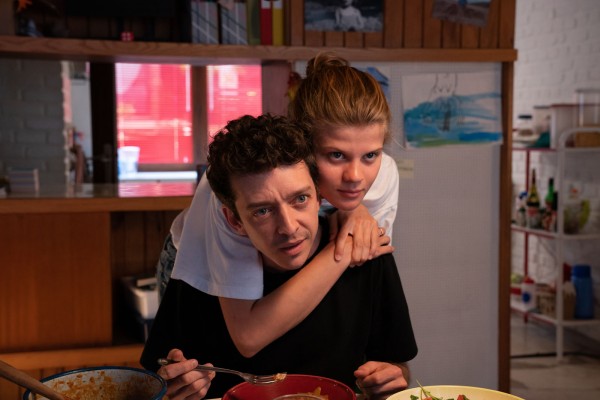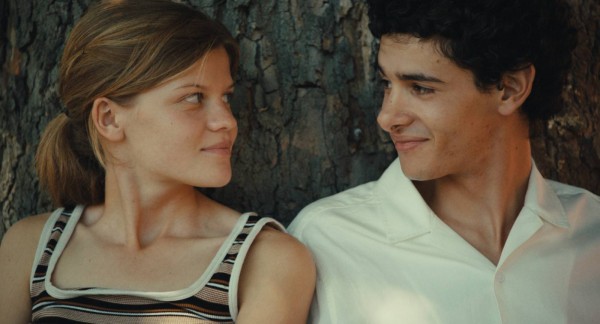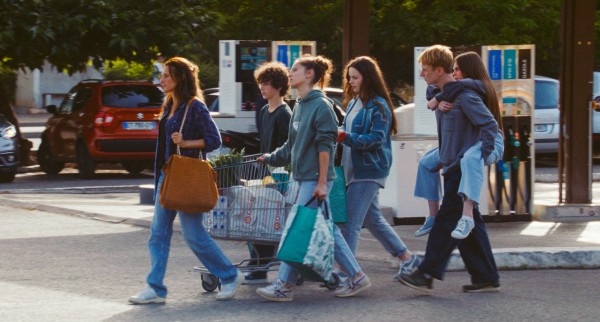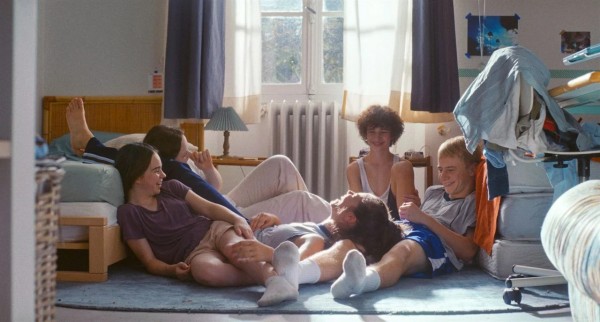-
NO LOVE LOST/LA FILLE DE SON PÈRE (Erwan Le Duc 2023)
ERWAN LE DUC: NO LOVE LOST/LA FILLE DE SON PÈRE (2023)

NAHUEL PEREZ BISCAYART AND CÉLESTE BRUNEQUELL IN NO LOVE LOST
A playful drama about continuity and change
Nahuel Perez Biscayart, the César-winning Argentinian-born star of Robin Campillo's 120 BPM, is at the center of this film, and three women revolve around him, Valérie, Hélène, and Rosa, and as Étienne, a frenetic amateur soccer (football) coach, he is like a stick figure with emotions, jaunty and fast. Erwan Le Duc tells his story in a spare, playful cinematic style that has something of the Nouvelle Vague about it, never more than in the first ten minutes when, in an inventively shot montage, Étienne and Valérie (Mercedes Dassy) meet cute over a painted soccer ball (she's an activist with a pot of red paint; his ball goes astray); cops break up a demo and he gets arrested; she leads him in a daring escape on foot and by motorboat; she gets pregnant and has a baby, and she disappears, leaving Étienne and his parents to raise baby Rosa.
Then jump forward seventeen years. Étienne is now 37 (Biscayart's real age: but his slim boyishness is ageless). He lives with Hélène (the somewhat underused Maud Wyler) now, and grown-up Rosa (the statuesque Céleste Brunnquell), whose big, colorful, loosely figurative paintings already fill the house.
"Mild pain, cracked gaiety: Buster Keaton and Kaurismäki have a cousin": thus Sophie Grassin of the French journal L'Obs summed up this spare little film about a man and his three loves. It plays with sadness at one remove, uncertain whether its characters can or cannot deal with change.
Rosa has "passed her Bac," and her results get her admitted to the art academy of Metz. Etienne drives up to look it over with her, and it's uncertain he will let ever quite her out of his sight. He brags of her to a teacher and precisely times the drives back and forth. In case we don't get how frenetic and bossy he is, there's scene with the miscellaneous soccer players in which Biscayart gets to do a hilarious mimicry of an over-jealous coach, all over the field, shouting instructions to every player.
But the French title, "Her Father's Daughter," has at least two meanings. She is her father's daughter because she has no mother. But she's also his daughter because she is like him, though we don't completely find out how much. The film doesn't tie things up: it ends with a new beginning.
A charming interlude is provided by Rosa's boyfriend, Youssef Horlaville (Mohammed Louridi), a handsome, rali-thin poet at work on an epic about Étienne, his tragedy, and his life now. It is Youssef who points out that there's a tragedy in Valérie's abandonment. (And Youssef is an "Arab" character who happily defies all stereotypes.) Étienne has avoided looking at that and so never dealt with it. Rosa holds back from Youssef, who climbs up to Rosa's bedroom from outside "to seem more of an adventurer" and sleeps in bed with her without touching. There is a rather too on-the-nose discussion between Étienne and Youssef about the latter's jerking off in the bathroom to deal with this situation. (It's not a permanent one.)
On a darker note, the famous writer-director Noémie Lvovsky, in a guest appearance, appears as the town Mayor to tell Étienne he's going to lose his municipal playing field. It is a sharply drawn cameo, her meanness and condescension out of tune with the rest. The news is a great shock for our hero. Still another big turnaround comes when Étienne spots Hélène - yes, he's quite sure it's she - on a TV program about a town on the Portuguese coast that has the world's highest waves. I was hoping we'd see Biscayart turn into a big-wave surfer. Instead he and Rosa have an argument and he falls down the stairs and gets an MRI and an overnight in hospital. He and Rosa both wind up in Portugal nonetheless. Watch Biscayart do another frenetic turn running nearly all the way from the hospital, with a drip stand, back home.
There is a throwaway confrontation of Étienne, Rosa, and Valérie on the beach in Portugal. It's saved from seeming a copout because the film has already established its strong mime element. (Remember "Buster Keaton and Kaurismäki have a cousin.") The Screen Daily critic calls this film "profoundly whimsical," not meant favorably. But I agree with Paris Match (not a rave) that says it seems about to lose its way but always lands on its feet because of its confident sui generis style. A very original film, a bit on the cool side but with moments of real charm.
No Love Lost/La Fille de son père, 91 mins., the director's sophomore feature, debuted as the Closing Film at Cannes Critics Week, May, 2023. Released in French theaters Dec. 20, 2023, it got an AlloCiné press rating 3.9 (78%) spectators 3.4 (68%).
Screened for this review as part of the Rendez-Vous with French Cinema at Lincoln Center, New York (Feb. 29-Mar. 10, 2024. Showtimes:
Monday, March 4 at 1:15pm
Saturday, March 9 at 1:00pm (Q&A with Erwan Le Duc and Maud Wyler)

CÉLESTE BRUNEQUELL AND MOHAMMED LOURIDI IN NO LOVE LOST
Last edited by Chris Knipp; 02-23-2024 at 10:37 AM.
Reason: E
-
TONI/TONI EN FAMILLE (Nathan Ambrosiani 2023)
NATHAN AMBROSIANI: TONI/TONI EN FAMILLE (2023)

Single mom with five, seeks a life
Everyone is brave in this touching study of a single mom, Toni (Camille Cottin of "Call My Agent" fame) raising five teenagers, three girls and two boys. She was once a TV pop singer but that was long ago. Two are about to leave the nest: Mathilde (Léa Lopez) is joining a dance company in Hungary; Marcus (Thmas Gioria), who's a vlogger and influencer, is off to the University of Lyon. That still leaves three young'uns. High schooler Camille (Louise Labèque), makes a surprise declaration at dinner that helps ruin Marcus' self-filmed gay coming-out, which becomes "How my family ruined my coming out." Timothée (Oscar Pauleau), in middle school, has his moment of high drama. It's hard to tell if it's a suicide attempt or alcohol poisoning, but he's rushed to hospital. When he comes to, the way his siblings all hug him shows how much they love each other. Afterwards he starts seeing a therapist again as he did when young. His need to visit dad at the cemetery hints just a little further at his special lacks and needs. Olivia (Juliane Lepoureau), the smallest, doesn't seem to be much trouble - until, of course it comes, a conflict with Timothée at school.
While each of Toni's children gets a moment, part of the point is that she hasn't found the time to feel each of them fully, so those moments don't sing. The ones that do are collective ones, which is where Toni admits she focuses. The trailer sequence par excellence is the one in the car that literally sings, when a radio station plays one of Toni's old hits and six voices are joined in wildly enthusiastic song: all you had to do was film it. Another, much more subtle, is just the six of them sitting in blue darkness watching TV and munching pizza after Mathilde's, for her, turbulent audition and doubt-riddled, tear-drenched hot shower aftermath. Marcus' failed coming out is a memorable small moment of truth and humor, of course, but its point is how flat it turns out to be. The film is full of things like this, and surges with togetherness. But in his effort to do what's necessary, the director finds little time for the unexpected - those pauses and surprises that make a film not just touching but memorable. What Toni en famille does is condense a whole TV series into a short feature film, which is remarkable, but also rather impossible - yet still fun.
Toni's university application is this film's ostensible goal, but it's an undercurrent, shyly gesturing to be let out: her lost personhood, her other, non-mom self, to be expressed, should it still be possible, through the tough process of going to university not only as a women in her forties, but with three kids and a house still to look after. Telling the kids isn't easy, and when she does, they show little enthusiasm. Her mom who pushed her into the TV singer role and wants to push her back (Catherine Mouchet) is even less understanding, a bad memory returned.
Success comes only at the end, when Toni learns she has been accepted, and we go to a special interview alongside her with a university officer who informs her of material provided online at home, plus extra course work and a tutor that are added, and warns her that a high proportion of the students like her don't finish. The final touching moment is her first day. The climax, a small beginning: when she calls one of her daughters to get talked into the courage to get out of the car and head toward the castle-like turrets of a college, in a stream of younger men and women. But for us, the viewers, this is just one thread, and the emotional center of the film has been life as a parent and the many dramas that come with having five teenagers in the house. An engaging, well-acted film.
Ambrosiani is something of a wunderkind, having directed his previous film at age 18, a horror film called Hostile at 14, and this one at 22. Toni shows him well on his way to mainstream success.
Toni/Toni en famille, 96 mins., debuted at a number of local french festivals in the summer of 2023, opening in French theaters Sept. 6. AlloCiné press rating 3.9 (78%), spectators 3.8 (76%). A DistribFilms release. Screened for this review as part of the Rendez-Vous with French Cinema at Lincoln Center, New York (Feb. 29-Mar. 10, 2024. Showtimes:
Saturday, March 2 at 1:00pm (Q&A with Nathan Ambrosioni)
Sunday, March 10 at 8:45pm

Last edited by Chris Knipp; 02-23-2024 at 10:38 AM.
 Posting Permissions
Posting Permissions
- You may not post new threads
- You may not post replies
- You may not post attachments
- You may not edit your posts
-
Forum Rules






 Reply With Quote
Reply With Quote


Bookmarks